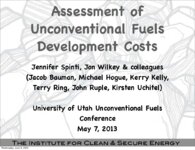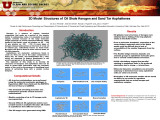TO
| Title | Date | Subject | Description | ||
|---|---|---|---|---|---|
| 226 |
 |
Asphalt Wash 1 XRF depth plots | 2014 | Asphalt Wash; depth plots | |
| 227 |
 |
Asphaltene rejection from bitumens via supercritical fluid extraction | 1993 | asphaltene rejection; bitumen; supercritical fluid extraction; SFE; asphaltene content | Supercritical fluid extraction (SFE) of bitumen was carried out in a continuous extractor using propane as the solvent at several temperatures and pressures. The asphaltene contents of the residual fractions in the extractor were compared to the asphaltene content of the original bitumen. Asphaltene... |
| 228 |
 |
Assay products from Green River oil shale | 1986-02-18 | Pyrolysis stoichiometry; Green River; Oil shale; Oil; Mahogany zone; Colorado; Utah; Pairwise correlation coefficients; Pyrolysis; Elemental analyses of shales and oils; Organic carbon; Gas composition; Elemental composition; Oil shale grade; Raw shale | Data from 66 material-balanced assays conducted at Lawrence Livermore National Laboratory, Laramie Energy Technology Center, and The Oil shale Corporation were compiled and analyzed to determine the pyrolysis stoichiometry for Green River formation oil shales originating in and near the Mahogany zon... |
| 229 |
 |
Assays of oil shale cuttings and cores, P. R. Spring and Hill Creek oil-impregnated sandstone deposits | 1977-07 | In 1973 the Utah Geological and Mineral Survey drilled sixteen core holes in the P.R. Spring and Hill Creek oil-impregnated sandstone deposits in the southeast Uinta Basin, Uintah county, Utah (figures 1 and 2). The holes were drilled in cooperation the U.S. Bureau of Mines under a grant from that a... | |
| 230 |
 |
Assessment and control of water contamination associated with shale-oil extraction and processing | 1979; 1980 | The Los Alamos National Laboratory's research on assessment and control of water contamination associated with oil shale operations is directed toward the identification of potential water contamination problems and the evaluation of alternative control strategies for controlling contaminants releas... | |
| 231 |
 |
Assessment of research needs for oil recovery from heavy-oil sources and tar sands | 1982-03 | The Fossil Energy Research Working Group (FERWG), at the request of J. W. Mares (Assistant Secretary for Fossil Energy) and A. W. Trivelpiece (Director, Office of Energy Research), has reviewed and evaluated the U.S. programs on oil recovery from heavy oil sources and tar sands. These studies were p... | |
| 232 |
 |
Assessment of unconventional fuels development costs | 2013-05-07 | ICSE; Unconventional fuels; Development cost; Oil Shale; In situ; Ex situ; Oil Sands; Utah; Uinta Basin | Presentation given at the University of Utah Unconventional Fuels Conference, Salt Lake City, Utah, May 7, 2013. |
| 233 |
 |
Association of uranium and other metals with crude oil, asphalt, and petroliferous rock | 1954-10 | uranium; crude oil; asphalt; petroliferous rock | Some crude oil, natural asphalt, and petroliferous rock are appreciably radioactive, but little is known about the actual uranium content and the chemical nature of the uranium compound or compounds in these materials. Semiquantitative spectrographic analyses of the ash of 29 samples of crude oil, 2... |
| 234 |
 |
Atomistic modeling of oil shale kerogen and asphaltenes | 2010-04-28 | Kerogen is a mixture of organic chemical compounds that make up a portion of the organic matter in sedimentary rocks. It is insoluble in normal organic solvents because of the large molecular weight (upwards of several thousand Daltons). When heated in the Earth's crust (oil window ca. 60 ° - 120 �... | |
| 235 |
 |
Atomistic modeling of oil shale kerogens and asphaltene along with their interactions with the inorganic mineral matrix | 2011-04 | atomistic modeling; oil shale kerogens and asphaltene; inorganic mineral matrix | The goal of this project is to obtain and validate three dimensional atomistic models for the organic matter in both oil shales and oil sands. In the case of oil shales the modeling was completed for kerogen, the insoluble portion of the organic matter; for oil sands it was for asphaltenes, a class ... |
| 236 |
 |
Atomistic modelling of oil shale kerogens and asphaltenes | 2012-10-21 | Atomistic modeling; Oil shale; Kerogens; Asphaltenes; 3D models; Pyrolysis; Computational modeling; Molecular mechanics; HyperCHem/ReaxFF; Ab initio calculations; Gaussian/GAMESS; DIFFUSE; CRYSOL | |
| 237 |
 |
Attachment 2 - Statement of program objectives clean and secure energy from domestic oil shale and oil sands resources | 2011-12 | ICSE; Oil shale research; Energy; Oil sands resources; Domestic oil shale; Environmental impact; Basin scale simulation; Liquid fuel production; In-situ thermal processing; Environmental; Legal; Policy issues; University of Utah | This Statement of Project Objectives (SOPO) reflects the performance period from October 1, 2010 through September 30, 2013. It includes tasks/subtasks funded in fiscal year 2009 (Phase 1) and tasks/subtasks funded in fiscal year 2010 (Phase II). Tasks/subtasks initiated during Phase I that are anti... |
| 238 |
 |
Attachment 2 - Statement of program objectives: Clean and secure energy from domestic oil shale and oil sands resources | 2009-09-24 | ICSE; University of Utah; Energy; Oil shale; Oil sands; CO2 capture; Liquid fuel; In-situ thermal processing; NOx emissions; CO2 emissions; Flameless oxy-gas process heaters; Efficient CO2 capture; Large Eddy Simulation; LES | The University of Utah (the Recipient), via their Institute for Clean and Secure Energy (the Institute), shall pursue research to improve industry's ability to utilize the vast energy stored in domestic oil shale and oil sands resources in a manner that shall minimize environmental impact and effect... |
| 239 |
 |
Attachment 3--Statement of project objectives (mod 003) | 2009 | Project; Research; Tasks; Industry; Academic; Public outreach; ISCE; DOE; Department of Energy; Repository; Large Eddy Simulation; LES; ARCHES; Oxy-coal; DQMOM; Power generation; Retrofit; Gasification; Entrained-flow; Radiation modeling; In-situ fuel production; Mercury control | This material is based upon work supported by the Department of Energy under Award Number FC26-08NT0005015. C. Tasks to be performed (Phase 2) |
| 240 |
 |
Attention-deficit/hyperactivity disorder diagnostic assessment methods used by advanced practice registered nurses. | 2004-05 | Diagnosis; Primary Care | This nonexperimental, exploratory research study used a self-administered questionnaire to gather data from advanced practice registered nurses (APRNs) in Utah. The results of this study imply that the majority of APRNs who diagnose and treat children with ADHD are family nurse practitioners (58.4%)... |
| 241 |
 |
Attrition and abrasion models for oil shale process modeling | 1991-10-25 | As oil shale is processed, line particles, much smaller than the original shale are created. This process is called attrition or more accurately abrasion. In this paper, models of abrasion are presented for oil shale being processed in several unit operations. Two of these unit operations, a fluidiz... | |
| 242 |
 |
Availability of tar sands on public land: An overview | 2006-09-21 | Tar sands; public lands; Utah; Leasing on federal lands; Hydrocarbonaceous material; Oil shale; Tar sand development | Presentation summary: 1-Provide an overview of Utah Tar Sand Resources 2-Provide historical summary Tar Sand Leasing on Federal Lands; -Early leasing efforts-1960, -Combined Hydrocarbon Leasing-1981, -Energy Policy Act of 2005 3-Outline current leasing process |
| 243 |
 |
Balancing energy resources | 2008-05-23 | Utah; Rocky Mountain Power; Wyoming; Utah Energy; Energy deficit; Greenhouse gas; Energy resources; Coal | Fulfilling our obligation: 1-Investing in the system to satisfy growing demand 2-Meeting increasing customer expectations with respect to the quality of our service 3-Addressing increasing concerns regarding the environment |
| 244 |
 |
Barriers to industrial development in Utah's portion of the four corners region | 1970-06-01 | Utah's portion of the Four Corners area is composed of the 21 counties which are south and/or east of Salt Lake County. The Utah Four Corners area covers 65,000 square miles which is approximately 80 percent of the state. The are a has a population of 274,500 dispersed throughout the region in a ver... | |
| 245 |
 |
Baseline scenario 1997 | 1997-09 | ||
| 246 |
 |
Baseline scenario 1998 | 1998-02 | ||
| 247 |
 |
Basic Institutional Data for the University of Utah | 2006-08-30 | Accreditation; Higher Education, University of Utah | Northwest Commission on Colleges and Universities Basic Institutional Data Form for the University of Utah |
| 248 |
 |
Basin oriented strategies for CO2 enhanced oil recovery: Alaska | 2005-04 | Alaska; North Slope; Cook Inlet; Oil; Gas; Oil recovery; EOR; CO2; Carbon dioxide; Oil fields; Oil production industry | The oil and gas producing regions of Alaska have nearly 45 billion barrels of oil which will be left in the ground, or "stranded", following the use of today's oil recovery practices. A major portion of this "stranded oil" is in reservoirs technically and economically amenable to enhanced oil recove... |
| 249 |
 |
Basin oriented strategies for CO2 enhanced oil recovery: Rocky Mountain Region | 2006-02 | Rocky Mountain; Colorado; Utah; Wyoming; Oil; Gas; Enhanced oil recovery; EOR; CO2; Carbon dioxide injection; Oil fields; Basin oriented strategies; Domestic oil production | The Rocky Mountain oil and gas producing region of Colorado, Utah and Wyoming has an original oil endowment of nearly 34 billion barrels. Of this, 11 billion barrels (33%) has been produced or proven. As such, nearly 23 billion barrels of oil will be left in the ground, or "stranded", following the ... |
| 250 |
 |
Basin-wide evaluation of the uppermost Green River Formation's oil-shale resource, Uinta Basin, Utah and Colorado | 2008 | Green River; Uinta Basin; Utah; Colorado; Crude oil; Green River Formation; Oil; Gas; Oil yield; Oil shale; Oil-shale thickness; Mahogany zone; R-7; Parachute Creek Member; Richness grade; Uintah County; Salt Lake Base Line and Meridian; BLM; U.S. Bureau of Land Management | Due to the recent increase in crude oil prices and concerns over diminishing conventional reserves, the Utah Geological Survey has reexamined the Uinta Basin's oil-shale resource, primarily in the Mahogany zone of the Green River Formation. Past assessments, the first conducted in 1964 and subsequen... |
